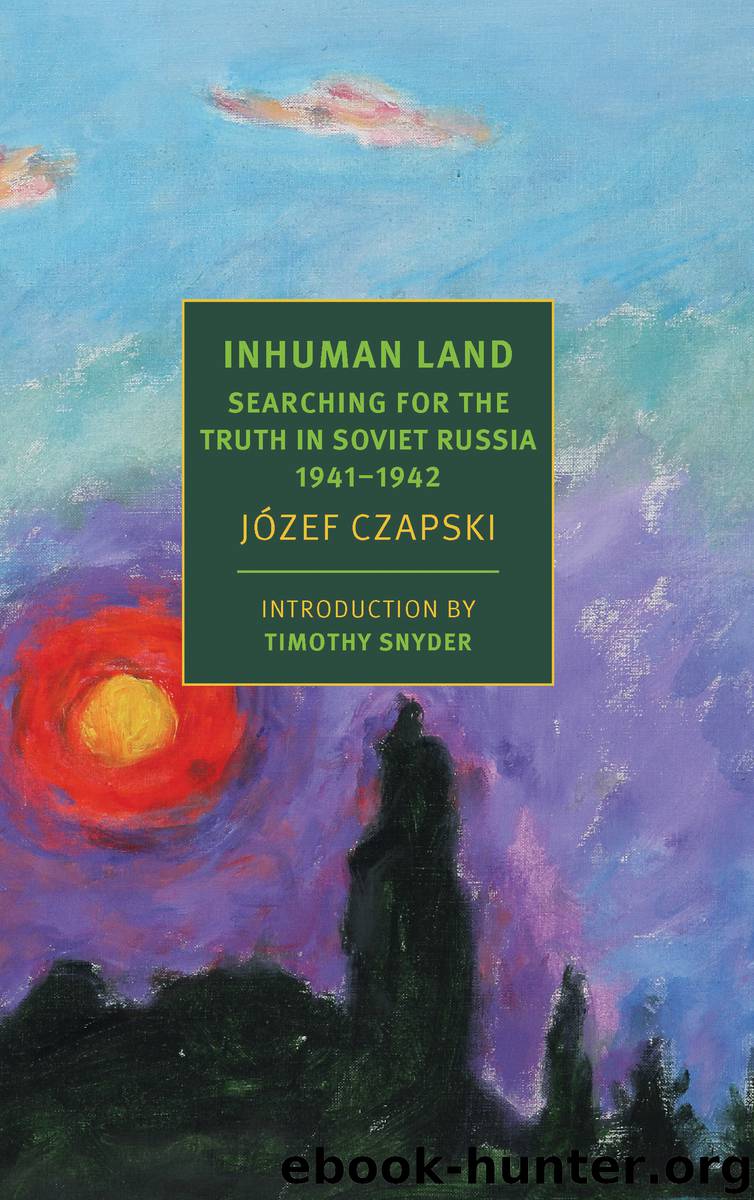Inhuman Land by Jozef Czapski

Author:Jozef Czapski
Language: eng
Format: epub
Publisher: New York Review Books
Published: 2018-11-04T12:27:20+00:00
1 We once told this story to a sympathetic American woman, who came to Poland in 1920 with the American Red Cross mission. She was most indignant. “Nothing of the sort!” she said. “One should die in a completely different place from where one was born!”
2 Kot means “cat.” —Trans.
3 The kitchen for private soldiers, which was under our management, served more generous, tastier rations.
4 See note on page 185.
15. YUNGIYUL II
IN THE same month, March 1942, there was a fierce struggle going on at the highest level for the very existence of our army in the Soviet Union. Our chief command suddenly received news from the commissariat of the Central Asian military district that from the twentieth day of the month we would only receive forty thousand rations of food,1 when as recently as December Stalin had agreed to build up the army to ninety-two thousand; at the start of that same March we already had seventy-five thousand soldiers, and the army was still growing by the day. Despite orders to the contrary and more and more restrictions on the railroads, not a day went by without new parties of “recruits” reaching our units.
The sudden halving of the soldiers’ rations put the army in a tragic situation.
Anders immediately sent a telegram requesting an audience with Stalin. In reply he received a telegram dated March 9, in which Stalin invited him to Moscow for a meeting, explaining that the size of the rations had been reduced because of nonreceipt of promised supplies of American grain, which was a result of the outbreak of war with Japan. “Nevertheless,” wrote Stalin in his telegram, “with great difficulty I have fought to maintain today’s level of provision for the Polish Army in the USSR until March 20. After this date it will be necessary to reduce the number of rations for the Polish Army to almost forty thousand.”
A few days later Anders flew to Moscow and was received at the Kremlin on March 18. Stalin demanded a reduction in the size of the army from seven (the number established in December) to three divisions and one reserve regiment. The rest of the soldiers already enlisted were to return to work at the collective farms, mines, and forests.
Anders realized that this was the start of the elimination of the army in the form established in December during General Sikorski’s trip to Moscow. Anders knew that if he went along with this decision, from one day to the next he would be condemning his soldiers to something that for many of them was worse than death—starvation as slave laborers. During the ninety-minute audience, he managed to achieve the dictator’s consent for the evacuation to Iran of all those units that Russia was not in a position to feed.2
News of the partial evacuation from Russia stirred such a reaction among the Polish masses, who somehow or other found out about it the length and breadth of Russia. Nowadays even those of us who lived through it are incapable of taking the strength of this impression on board.
Download
This site does not store any files on its server. We only index and link to content provided by other sites. Please contact the content providers to delete copyright contents if any and email us, we'll remove relevant links or contents immediately.
Fanny Burney by Claire Harman(26591)
Empire of the Sikhs by Patwant Singh(23069)
Out of India by Michael Foss(16843)
Leonardo da Vinci by Walter Isaacson(13309)
Small Great Things by Jodi Picoult(7112)
The Six Wives Of Henry VIII (WOMEN IN HISTORY) by Fraser Antonia(5493)
The Wind in My Hair by Masih Alinejad(5085)
A Higher Loyalty: Truth, Lies, and Leadership by James Comey(4946)
The Crown by Robert Lacey(4802)
The Lonely City by Olivia Laing(4796)
Millionaire: The Philanderer, Gambler, and Duelist Who Invented Modern Finance by Janet Gleeson(4460)
The Iron Duke by The Iron Duke(4348)
Papillon (English) by Henri Charrière(4252)
Sticky Fingers by Joe Hagan(4186)
Joan of Arc by Mary Gordon(4094)
Alive: The Story of the Andes Survivors by Piers Paul Read(4017)
Stalin by Stephen Kotkin(3956)
Aleister Crowley: The Biography by Tobias Churton(3628)
Ants Among Elephants by Sujatha Gidla(3459)
